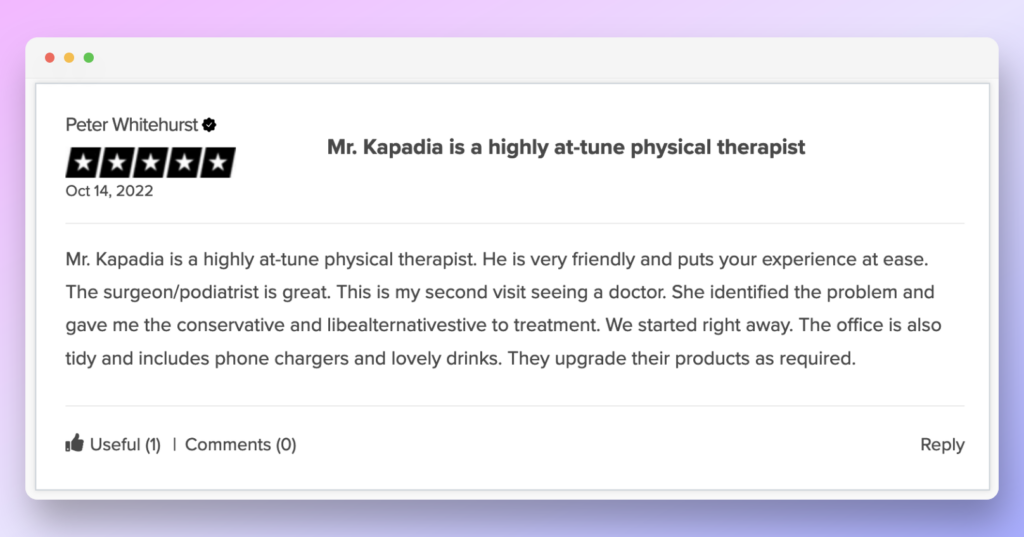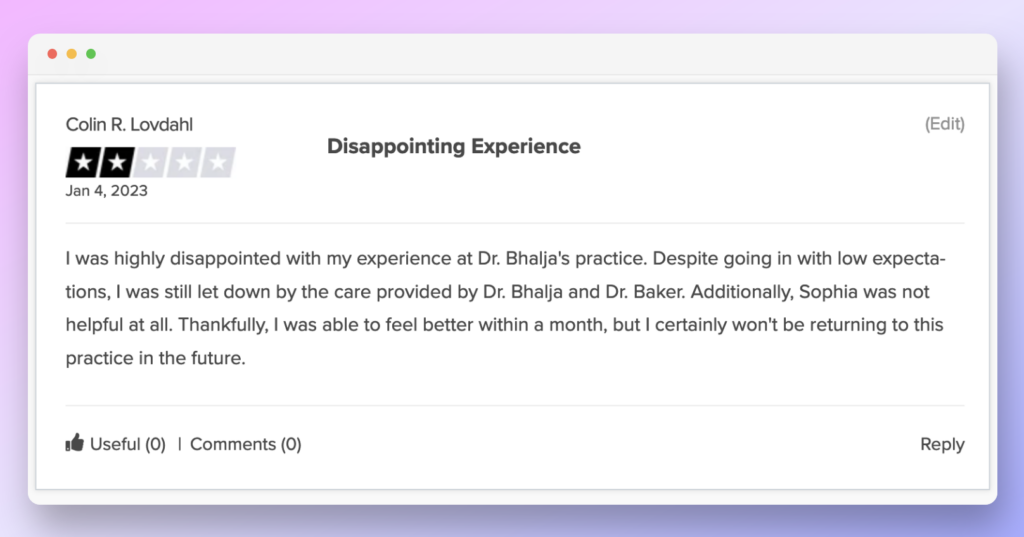When seeking help from a therapist, people often trust mental health professionals.
Expecting therapists to guide them through challenging times, patients share their pain and challenges.
In short, the therapeutic journey is a deeply personal and sensitive one.
That said, a positive or negative experience with a therapist can significantly impact a person’s well-being.
Writing a good review for a therapist is not only an opportunity to express gratitude but also a chance to help others make informed decisions.
Tweet
If you have been wondering how to start writing a review about your therapist, you have come to the right place.
This article will discuss the essential elements of a thoughtful and constructive review for a therapist.
1. Honesty and Objectivity
The foundation of any good review is honesty.
Therefore, be transparent about your therapist experience while remaining objective.
Do not deviate from the topic, and remember that the review is about how your therapist handled your problems and not the challenges alone.
However, you must focus on your personal experience without exaggerating or undermining the therapist’s abilities.
Mention both positive and challenging aspects of your sessions.
Remember that your review may influence someone else’s life, so be mindful of your words.
2. Start with a Captivating Introduction
Make sure to write an engaging introduction.
The first few lines are what will decide if readers are going to read the entire review.
Briefly mention the reasons that led you to seek therapy.
You do not have to explain everything in detail, but a little context would be helpful for readers as this can help readers identify if they relate to your situation.
Introduce the therapist and share your initial expectations or hopes for the process.
These would set the context for your review and allow readers to connect with your journey.
3. Discuss the Therapist’s Qualifications and Approach
After you have completed the introduction, it’s time to give more details about your therapists.
It would help to focus on the therapist’s qualifications and therapeutic approach here.
Describe their educational background, certifications, and any specializations relevant to your needs.
Additionally, explain the therapist’s therapeutic process, such as cognitive-behavioral therapy, psychodynamic therapy, or mindfulness-based therapy.
This information will help potential individuals understand the therapist’s expertise and if it aligns with their preferences.
4. Evaluate Communication and Empathy
One of the most crucial aspects of therapy is the therapeutic relationship.
Evaluate how effectively the therapist communicated with you.
Moreover, share the level of empathy they displayed during your sessions.
For instance, did they actively listen to your concerns and validate your feelings?
A good therapist fosters a safe and non-judgmental environment.
This would allow others to open up and explore their emotions with an open mind.
5. Assess Goal Setting and Progress
Do not forget to reflect on the goals you set with your therapist at the beginning of your sessions.
In your review, you must assess how well they were addressed throughout the therapeutic journey.
Things like a treatment plan designed particularly for your case.
Share in your review if the therapist helped you develop a precise treatment plan.
Also, mention if you noticed progress towards your goals over time.
These details could offer valuable insights into the therapist’s effectiveness.
It would also help others identify the capabilities of your therapist and instill trust.
Exciting read: BetterHelp Controversies, Horror Stories, and Alternative to Explore
6. Mention Flexibility and Accessibility
Apart from expertise, people often look for flexibility in accessibility for their therapists.
For instance, if the therapist is flexible in scheduling appointments.
Are they responsive to your needs outside of sessions?
Some individuals have busy schedules, and accommodating their availability is vital to ensure a successful therapeutic experience.
Mention any instances where the therapist went above and beyond to support you during difficult times.
Acknowledging these qualities of your therapists would be a great way to put their efforts in front of others.
7. Discuss Respect for Boundaries and Confidentiality
We all know that therapy is built on two critical factors: trust and confidentiality.
Therefore, it would be wise to include such details in your review.
Share your experience regarding how the therapist respected your boundaries and maintained confidentiality.
You can also discuss situations where you felt uncomfortable or if the therapist crossed any professional boundaries.
Conversely, if you thought your privacy was well-preserved, highlight that too.
8. Addressing Challenges
It is not uncommon for people to face challenges during the therapeutic journey.
Hence, do not hesitate to discuss the difficulties you faced during therapy.
Just remember, you must avoid using harsh language or making personal attacks.
Instead, focus on how the therapist responded to these challenges and whether they worked with you to find practical solutions.
9. Impact on Your Well-being
It would be wonderful to add details about the overall impact of therapy on your well-being and daily life.
Share your experience and positive changes in your mental health and personal growth.
How did the therapist’s guidance contribute to these improvements?
Adding these insights to your review can help potential patients envision the benefits of working with the therapist.
10. Summarize Your Experience
Lastly, do not forget to conclude your review by summarizing your overall experience with the therapist.
Most readers just read the first few lines and the last ones.
So, keeping it straightforward and precise would help.
Emphasize the key points you mentioned throughout the review and reiterate the therapist’s strengths and areas for growth.
End on a positive note, expressing your gratitude if you found therapy beneficial.
Templates for Therapist Reviews
Here, we compiled five templates for positive reviews and five for negative reviews for a therapist:
Positive Review Templates:
- The Transformative Journey: “I started therapy with [Therapist’s Name] due to [reasons for seeking therapy]. Their qualifications, including [mention qualifications], made me confident in their abilities. They used [type of therapy], which was very effective for me. They were empathetic, actively listened to my concerns, and validated my feelings. We set clear goals, and I noticed significant progress over time. They were also flexible with scheduling and always respected my boundaries. My mental health has improved greatly, and I’m grateful for their support.”
- The Empathetic Guide: “My journey with [Therapist’s Name] has been transformative. They have [mention qualifications] and used [type of therapy] to help me navigate my issues. Their communication was clear and empathetic, making me feel safe and understood. We set achievable goals, and I’ve seen a lot of progress. They were always available when I needed them and respected my privacy. I can confidently say that my well-being has improved thanks to their guidance.”
- The Effective Communicator: “I sought therapy with [Therapist’s Name] because [reasons for seeking therapy]. They have [mention qualifications], and their approach using [type of therapy] was very effective for me. They were empathetic, communicated effectively, and set clear goals that we consistently worked towards. Their flexibility with scheduling and respect for my boundaries made the process smoother. Thanks to their support, I’ve significantly improved my mental health.”
- The Supportive Listener: “My experience with [Therapist’s Name] has been very positive. Their qualifications, including [mention qualifications], gave me confidence in their abilities. They used [type of therapy], which I found very helpful. They were empathetic, communicated effectively, and we set clear goals that I made progress towards. They were flexible with scheduling and always respected my privacy. My mental health and personal growth have improved significantly thanks to their guidance.”
- The Goal-Oriented Helper: “I started therapy with [Therapist’s Name] due to [reasons for seeking therapy]. They have [mention qualifications] and used [type of therapy], which was very effective for me. They were empathetic, communicated effectively, and we set clear goals that I made progress towards. They were flexible with scheduling and always respected my boundaries. My mental health has improved greatly, and I’m grateful for their support.”
Negative Review Templates:
- The Ineffective Approach: “I sought therapy with [Therapist’s Name] due to [reasons for seeking therapy]. While they have [mention qualifications], I found their approach using [type of therapy] ineffective. I felt they lacked empathy, and their communication was not clear. We set goals, but I didn’t notice much progress. They were not flexible with scheduling, and I felt my boundaries were not respected. Unfortunately, I didn’t see much improvement in my mental health.”
- The Disappointing Experience: “My experience with [Therapist’s Name] was disappointing. Despite their qualifications, including [mention qualifications], their [type of therapy] approach didn’t work for me. They lacked empathy, and their communication was unclear. We set goals, but I didn’t see any significant progress. They were inflexible with scheduling, and I felt my boundaries were crossed. Sadly, my mental health didn’t improve as I had hoped.”
- The Unmet Expectations: “I started therapy with [Therapist’s Name] due to [reasons for seeking therapy]. They have [mention qualifications], but their approach using [type of therapy] was ineffective for me. They lacked empathy and unclear communication, and we set goals, but I didn’t notice much progress. They were not flexible with scheduling, and I felt my privacy was not respected. Unfortunately, my mental health didn’t improve.”
- The Unfulfilled Goals: “My journey with [Therapist’s Name] was not as I expected. Despite their qualifications, including [mention qualifications], their [type of therapy] approach didn’t work for me. They lacked empathy, and their communication was not clear. We set goals, but I didn’t see any significant progress. They were inflexible with scheduling, and I felt my boundaries were not respected. Sadly, my mental health didn’t improve as I had hoped.”
- The Crossed Boundaries: “I sought therapy with [Therapist’s Name] due to [reasons for seeking therapy]. While they have [mention qualifications], I found their approach using [type of therapy] ineffective. I felt they lacked empathy, and their communication was not clear. We set goals, but I didn’t notice much progress. They were not flexible with scheduling, and I felt my boundaries were crossed. Unfortunately, I didn’t see much improvement in my mental health.”
These templates can be adjusted based on your experiences with the therapist or the company offering therapist services and details of the therapy for writing the review.
Below are the examples based on the template.
Exciting read: BetterHelp Customer and Therapist Reviews
Therapist Positive Review

Therapist Negative Review

Conclusion
Writing a good review for a therapist requires thoughtfulness, honesty, and objectivity.
Sharing your experience can help others make informed decisions when seeking mental health support.
As discussed, when writing a good review for a therapist, you must focus on his or her qualifications, communication skills, empathy, goal-setting abilities, and respect for boundaries.
Do not shy away from mentioning any challenges you encountered.
And at last, conclude your review by summarizing the overall impact of therapy.

